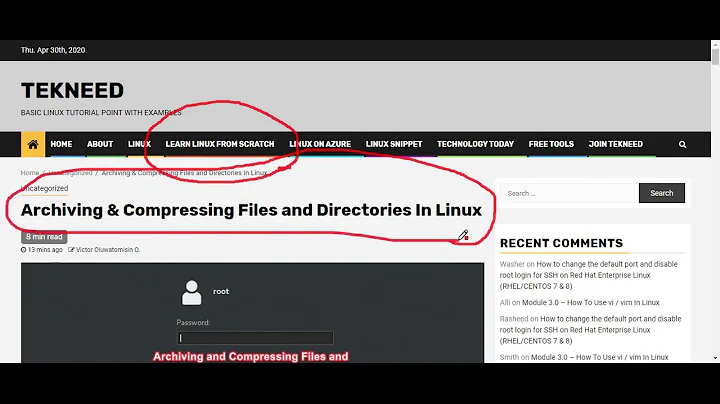Tar archiving that takes input from a list of files
Solution 1
Yes:
tar -cvf allfiles.tar -T mylist.txt
Solution 2
Assuming GNU tar (as this is Linux), the -T or --files-from option is what you want.
Solution 3
You can also pipe in the file names which might be useful:
find /path/to/files -name \*.txt | tar -cvf allfiles.tar -T -
Solution 4
Some versions of tar, for example, the default versions on HP-UX (I tested 11.11 and 11.31), do not include a command line option to specify a file list, so a decent work-around is to do this:
tar cvf allfiles.tar $(cat mylist.txt)
Solution 5
On Solaris, you can use the option -I to read the filenames that you would normally state on the command line from a file. In contrast to the command line, this can create tar archives with hundreds of thousands of files (just did that).
So the example would read
tar -cvf allfiles.tar -I mylist.txt
Related videos on Youtube
Danf
Updated on February 02, 2020Comments
-
Danf over 4 years
I have a file that contain list of files I want to archive with tar. Let's call it
mylist.txtIt contains:
file1.txt file2.txt ... file10.txtIs there a way I can issue TAR command that takes
mylist.txtas input? Something liketar -cvf allfiles.tar -[someoption?] mylist.txtSo that it is similar as if I issue this command:
tar -cvf allfiles.tar file1.txt file2.txt file10.txt-
Ogre Psalm33 over 10 yearsThe tar man page is extremely unhelpful for this option (at least on RedHat 5.4 thru 6.3): "-T: get names to extract or create from file F". "Extract or create" sounds like it applies to taking files out of the tar archive, but not putting them in. The
-Xexclude option survives from the old Unix tar command, but apparently -I (include) did not! -
sam boosalis about 5 yearsThere are few
manpages with anEXAMPLESsection, despite it being a standard section. See <unix.stackexchange.com/questions/306189/…>.
-
-
drue about 10 yearsThis option also exists in "bsdtar 3.1.2" on FreeBSD 10.
-
Stphane over 8 yearsWhat if the .txt files list is really huge ? Should one use xarg command with tar -r.. instead of tar -c.. ?
-
woot over 8 years@Stphane Hmm, I don't think the length of the list matters much for this method. In fact, I would imagine this method is better than xargs as xargs will rerun tar over and over to append data, but I haven't really tested the methods side by side.
-
 David C. Rankin almost 8 yearsUUoC (unnecessary use of
David C. Rankin almost 8 yearsUUoC (unnecessary use ofcat), simply$(<mylist.txt). -
Andre Holzner over 6 yearsnote that this may exceed the maximum length of the command line if
mylist.txtis large -
 Mike D about 6 yearsin that case
Mike D about 6 yearsin that casetar -T <(<mylist.txt). redundant like this answer. -
Stphane almost 6 yearsI wish I could put comments in mylist.txt .. is there any workaround using some tar option from inside mylist.txt ?
-
Matt G over 5 years@Stphane that's simple, using the --exclude flag allows this. Assuming your comment lines start with a '#', a command such as the following would ignore / exclude any attempted file operations on lines containing cmments, i.e. your command can look like this: tar -cvf allfiles.tar --exclude='^#' -T mylist.txt. Tar reports an error, but when you check your tar archive, there are no errors, and all files from the list are inside your archive.
-
Nasri Najib almost 5 yearsPointing out that this command is for linux variant and for those on sunOS or other variants, do check out the other answers below. E.g. For sunOS, two alternatives I have tested: tar -cvf file.tar -I list.txt and tar -cvf file.tar $(cat list.txt)
-
 Richard Gomes over 4 yearsWhen a pipe is employed, which is the case here, the operating system creates streams on both sides of the pipe and synchronizes production and consumption of data. The list of files could be infinite. You could tar/gz the entire internet using a Raspberry Pi Zero, given that you have enough storage on the end of the pipe.
Richard Gomes over 4 yearsWhen a pipe is employed, which is the case here, the operating system creates streams on both sides of the pipe and synchronizes production and consumption of data. The list of files could be infinite. You could tar/gz the entire internet using a Raspberry Pi Zero, given that you have enough storage on the end of the pipe. -
Roland about 4 years
-L mylist.txton AIX -
 drevicko almost 4 years@Stpihane if you did eg
drevicko almost 4 years@Stpihane if you did egfind /path/to -name '*.txt' -exec tar -cvf all.tar {} \+you'd be in trouble, yes, asfindwould execute the tar command multiple times with successive subsets of the files. Only the last subset would be in the archive, as it would be created anew for each tar execution. -
 Omari Victor Omosa over 3 yearsHow do you tar and not include full path?
Omari Victor Omosa over 3 yearsHow do you tar and not include full path? -
Stalinko over 3 yearsMy one-liner to use with pigz:
find /path/to/files -name '*.log*' | tar -cvf - -T - | pigz -9 > logs.tgz -
 William almost 3 yearsYou may also want to add a "--verbatim-files-from" option (before the -T), otherwise items in the list file which start with a dash (like -h or --dereference) will be treated as tar commands.
William almost 3 yearsYou may also want to add a "--verbatim-files-from" option (before the -T), otherwise items in the list file which start with a dash (like -h or --dereference) will be treated as tar commands. -
 grenix over 2 yearsJust wonder if this would work 'cat mylist.txt | tr '\n' '\0' | xargs -0L1 tar rf allfiles.tar' to avoid exceeding command line length. With 'tar rf' files are appended to archive. -0L1 stands for taking only one line from the file. -0L2, -0L3, ... should also be possible
grenix over 2 yearsJust wonder if this would work 'cat mylist.txt | tr '\n' '\0' | xargs -0L1 tar rf allfiles.tar' to avoid exceeding command line length. With 'tar rf' files are appended to archive. -0L1 stands for taking only one line from the file. -0L2, -0L3, ... should also be possible -
 Maske over 2 yearsIn debian based the option is
Maske over 2 yearsIn debian based the option is-T, --files-from=FILE.










